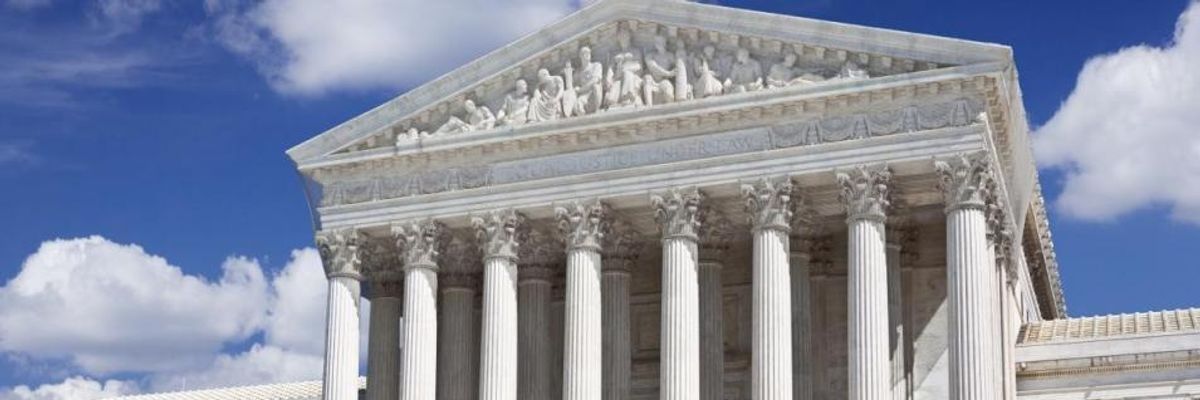For more than 40 years, arguments against "dark money" have lost at the Supreme Court. Now, however, the Court could reinforce the growing influence of this type of secret funding for political campaigns.
"If the Americans for Prosperity Foundation wins at the Supreme Court, every nonprofit that launders dark money for corporations or the wealthy will rely on this new case to keep the dark money sources under wraps."
In Americans for Prosperity Foundation v. Rodriquez, to be argued on April 26, the justices will consider the right to confidentiality for donations to nonprofits. It could have significant implications given how corporations and wealthy individuals hide their role in politics by routing their money through opaque nonprofits.
The Americans for Prosperity Foundation and another nonprofit argue in the case pending before the Supreme Court that California has no interest in knowing who their major donors are -- which is consistent with a type of argument has been made in other campaign finance cases throughout the years involving donor disclosure. And for more than 40 years in the campaign finance context, these arguments have lost, as the Supreme Court has repeatedly ruled that the disclosure of donors behind political campaigns and political ads is constitutional. The Supreme Court ruled this way in Buckley v. Valeo in 1976, and it came to the same conclusion in McConnell v. FEC in 2003, in Citizens United v. FEC in 2010, and in McCutcheon v. FEC in 2014.
The Supreme Court has said in these campaign finance cases that disclosure in such contexts is justified by three state interests. The first two are the voter informational interest in knowing who is bankrolling candidates and the anti-corruption interest in preventing corruption and the appearance of corruption, since criminals are less likely to commit a crime in broad daylight. The third is the anti-circumvention interest in enforcing other aspects of campaign finance, such as hard money limits or the ban on donations from foreign nationals.
However, Americans for Prosperity Foundation is a slightly different case because it doesn't arise in the campaign finance context. Instead, in this case, the California is regulating charities which solicit money in California to ensure that they are not defrauding the public. The Americans for Prosperity Foundation argues that an old line of cases known as NAACP v. Alabama protects it from having to reveal its donors to the state, even on a confidential basis. (Under current law, California doesn't disclose the identities of donors to the public.)
In the original NAACP case from 1958, the Supreme Court recognized that if Alabama had the names of local NAACP members, it could put African Americans at risk of harassment. And if anything, that "harassment" language undersold the risks that Black Americans faced in the Deep South in the 1950s for being known as active members of the group. In 1951, for example, Harry T. Moore and his wife were killed in a Christmas Day bombing of his home because he was believed to be the secretary of the NAACP's Florida chapter. (Moore had, in fact, already left the organization when he was killed.) His murder has never been solved. Even after the 1958 case was decided, murders of NAACP leaders continued. In 1963, Medgar Evers, Mississippi field secretary for the organization, was shot in his driveway. And in 1965, George Metcalfe, another NAACP leader from Mississippi, was killed in a car bombing.
In other words, the NAACP, as a nonprofit organization, made a valid point in the 1958 case when it argued that naming names presented a palpable threat of harassment. In its ruling, the Supreme Court decided that NAACP members had a First Amendment right to association that protected them from Alabama's prying.
The Americans for Prosperity Foundation is arguing that it, too, will be subject to harassment and that it has a First Amendment right to keep its donors confidential from the state of California. The organization won this argument in the district court, while California won on appeal in the Ninth Circuit.
According to Open Secrets, the political arm of APF, the Americans for Prosperity Action PAC, spent $60 million in the 2020 election cycle. According to Issue One, Americans for Prosperity is one of the top 15 dark money groups. Because they are opaque it's not clear what the exact relationship is here.
There are plenty of things to distinguish the context of the NAACP in the 1950s and 1960s and the Americans for Prosperity today. According to Source Watch, both AFP entities were originally funded by the Koch brothers, Charles and David. David Koch died in 2019. The Kochs at the time of David's death were two of the richest Americans alive -- to the tune of as much as $100 billion. By comparison, the NAACP during the 1950s and 1960s was a scrappy nonprofit with many poor individuals as members. Comparing the two is like comparing apples and diamond encrusted Rolexes.
The problem is that if the Americans for Prosperity Foundation wins at the Supreme Court, every nonprofit that launders dark money for corporations or the wealthy will rely on this new case to keep the dark money sources under wraps. And that's bad news for our democracy.

